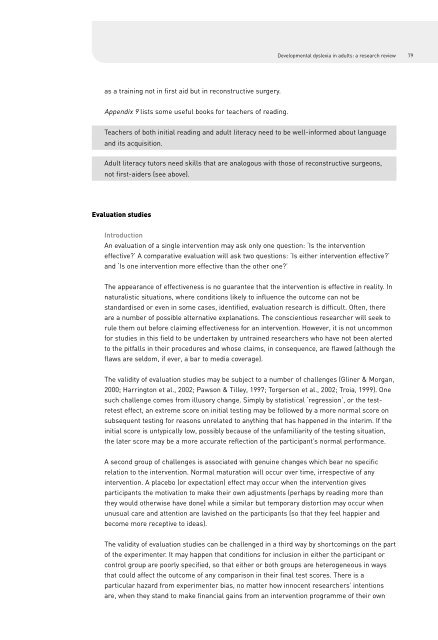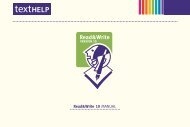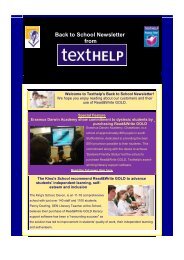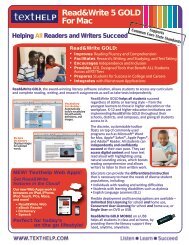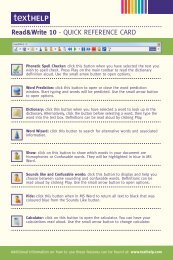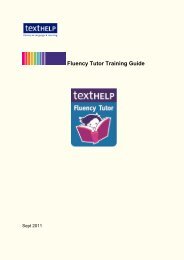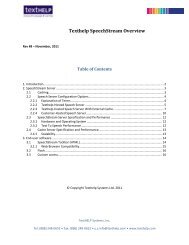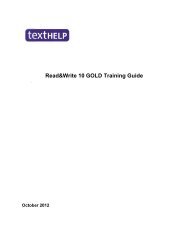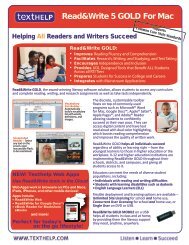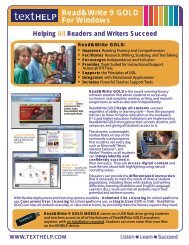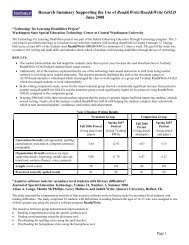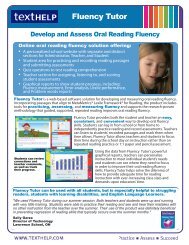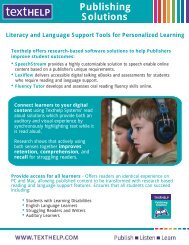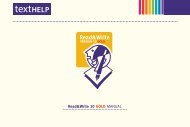01 NRDC Dyslexia 1-88 update - Texthelp
01 NRDC Dyslexia 1-88 update - Texthelp
01 NRDC Dyslexia 1-88 update - Texthelp
You also want an ePaper? Increase the reach of your titles
YUMPU automatically turns print PDFs into web optimized ePapers that Google loves.
Developmental dyslexia in adults: a research review 79<br />
as a training not in first aid but in reconstructive surgery.<br />
Appendix 9 lists some useful books for teachers of reading.<br />
Teachers of both initial reading and adult literacy need to be well-informed about language<br />
and its acquisition.<br />
Adult literacy tutors need skills that are analogous with those of reconstructive surgeons,<br />
not first-aiders (see above).<br />
Evaluation studies<br />
Introduction<br />
An evaluation of a single intervention may ask only one question: ‘Is the intervention<br />
effective?’ A comparative evaluation will ask two questions: ‘Is either intervention effective?’<br />
and ‘Is one intervention more effective than the other one?’<br />
The appearance of effectiveness is no guarantee that the intervention is effective in reality. In<br />
naturalistic situations, where conditions likely to influence the outcome can not be<br />
standardised or even in some cases, identified, evaluation research is difficult. Often, there<br />
are a number of possible alternative explanations. The conscientious researcher will seek to<br />
rule them out before claiming effectiveness for an intervention. However, it is not uncommon<br />
for studies in this field to be undertaken by untrained researchers who have not been alerted<br />
to the pitfalls in their procedures and whose claims, in consequence, are flawed (although the<br />
flaws are seldom, if ever, a bar to media coverage).<br />
The validity of evaluation studies may be subject to a number of challenges (Gliner & Morgan,<br />
2000; Harrington et al., 2002; Pawson & Tilley, 1997; Torgerson et al., 2002; Troia, 1999). One<br />
such challenge comes from illusory change. Simply by statistical ‘regression’, or the testretest<br />
effect, an extreme score on initial testing may be followed by a more normal score on<br />
subsequent testing for reasons unrelated to anything that has happened in the interim. If the<br />
initial score is untypically low, possibly because of the unfamiliarity of the testing situation,<br />
the later score may be a more accurate reflection of the participant’s normal performance.<br />
A second group of challenges is associated with genuine changes which bear no specific<br />
relation to the intervention. Normal maturation will occur over time, irrespective of any<br />
intervention. A placebo (or expectation) effect may occur when the intervention gives<br />
participants the motivation to make their own adjustments (perhaps by reading more than<br />
they would otherwise have done) while a similar but temporary distortion may occur when<br />
unusual care and attention are lavished on the participants (so that they feel happier and<br />
become more receptive to ideas).<br />
The validity of evaluation studies can be challenged in a third way by shortcomings on the part<br />
of the experimenter. It may happen that conditions for inclusion in either the participant or<br />
control group are poorly specified, so that either or both groups are heterogeneous in ways<br />
that could affect the outcome of any comparison in their final test scores. There is a<br />
particular hazard from experimenter bias, no matter how innocent researchers’ intentions<br />
are, when they stand to make financial gains from an intervention programme of their own


